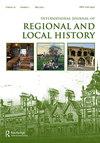罢工者与市民:战后哈威克的公民文化与劳资关系
Q2 Arts and Humanities
International Journal of Regional and Local History
Pub Date : 2016-07-02
DOI:10.1080/20514530.2016.1252514
引用次数: 4
摘要
在帕特里克·乔伊斯(Patrick Joyce)的研究之后,越来越多的人意识到,英国的阶级形成受到地方层面原有文化的影响。哈威克的案例表明,战后时期也是如此:直到1972年,雇主和工人的态度都受到公民自豪感和尊重的霸权传统的影响,将该镇的去工业化经历牢牢地固定在当地历史中。本文以当年当地针织工人的罢工为重点,探讨了公民身份和社区凝聚力的传统如何塑造了该镇的全球化和经济衰退经历,认为这一危机时刻应被解读为对传统规范的重新谈判,而不是对传统规范的全面取代。沿着阶级路线组织起来的抗议活动,远不能表明一种强大的阶级意识,而只是重新谈判中的一个讨价还价的筹码。本文章由计算机程序翻译,如有差异,请以英文原文为准。
Strikers and Townsfolk: civic culture and industrial relations in post-war Hawick
Following the work of Patrick Joyce, there has been an increasing awareness that class-formation in Britain was tempered by pre-existing cultures at the local level. The case of Hawick suggests that this was no less true of the post-war period: as late as 1972, the attitudes of employers and workers alike were shaped by a hegemonic tradition of civic pride and deference, anchoring the town's experience of deindustrialisation in a deeply local history. Focusing on the local knitwear workers' strike of that year, this article explores how civic identity and traditions of community cohesion shaped the town's experience of globalisation and economic decline, arguing that this moment of crisis should be read as a renegotiation of traditional norms, rather than their wholesale replacement. Protest organised along class lines, far from indicating a potent class consciousness, was simply a bargaining chip in that renegotiation.
求助全文
通过发布文献求助,成功后即可免费获取论文全文。
去求助
来源期刊

International Journal of Regional and Local History
Arts and Humanities-History
CiteScore
0.30
自引率
0.00%
发文量
10
期刊介绍:
The International Journal of Regional and Local History aims to publish high-quality academic articles which address the history of regions and localities in the medieval, early-modern and modern eras. Regional and local are defined in broad terms, encouraging their examination in both urban and rural contexts, and as administrative, cultural and geographical entities. Regional histories may transcend both local and national boundaries, and offer a means of interrogating the temporality of such structures. Such histories might broaden understandings arrived at through a national focus or help develop agendas for future exploration. The subject matter of regional and local histories invites a number of methodological approaches including oral history, comparative history, cultural history and history from below. We welcome contributions situated in these methodological frameworks but are also keen to elicit inter-disciplinary work which seeks to understand the history of regions or localities through the methodologies of geography, sociology or cultural studies. The journal also publishes book reviews and review articles on themes relating to regional or local history.
 求助内容:
求助内容: 应助结果提醒方式:
应助结果提醒方式:


